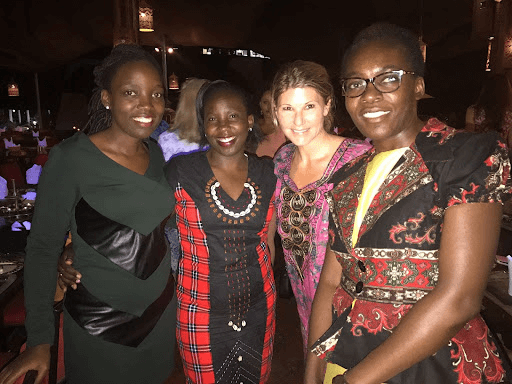Guest post by Beth Steinberg, TechWomen Mentor, Speaker and Delegate for 10+ years
For a decade, I have had the privilege of being part of TechWomen, a transformative program that has significantly shaped my professional journey. TechWomen, an initiative of the U.S. Department of State’s Bureau of Educational and Cultural Affairs (ECA), aims to empower, connect, and support the next generation of women leaders in science, technology, engineering, and mathematics (STEM) across Africa, Central/South Asia, and the Middle East.
My involvement in TechWomen has been nothing short of enriching, contributing profoundly to my personal and professional growth. The program has not only equipped me with valuable skills but has also honed my leadership abilities and enhanced my collaborative prowess, making me a more effective leader and colleague.
In contemplating the essence of leadership, I have come to recognize a significant intersection with diplomacy – a realization that emerged during my participation in the TechWomen program. Diplomacy, at its core, involves bridging divides, finding common ground, and influencing others through respect and understanding rather than mere authority. Strikingly, these principles seamlessly align with the qualities of effective leadership.
As we engaged with female scientists, technologists, engineers, and mathematicians from diverse regions, I observed that the most impactful leaders demonstrated key diplomatic skills. They excelled as relationship-builders, connecting with individuals from vastly different backgrounds. Their ability to actively listen, understand differing perspectives, and champion inclusivity reflected the core competencies cultivated in diplomats.
Reflecting on my own approach within the TechWomen cohort, I realized the inherent parallels between diplomacy and leadership. When faced with challenges or conflicts, I leveraged conflict resolution tactics akin to a diplomat’s toolbox – facilitating dialogue, seeking consensus, and compromising without compromising key objectives. Recognition, motivation through inspiration, and leading by example became integral facets of my leadership style, mirroring the behaviors diplomats exhibit as representatives of their countries.
Beyond individual experiences, programs like TechWomen illuminate how diplomacy and leadership mutually reinforce each other in driving positive change. Diplomatic efforts were instrumental in establishing and expanding this program, which empowers women in STEM fields across critical global regions. Developing strong female leaders in science and technology aligns seamlessly with diplomatic priorities such as inclusion, innovation, cooperation, and mutual prosperity.
My time with TechWomen underscored that leadership and diplomacy draw upon a shared set of capabilities while mutually reinforcing shared goals. Embracing leadership opportunities and learning from fellow leaders became a multiplier that enhanced relationships, aligned efforts, and expanded positive impact. The analogies between these noble callings brought this into focus for me, crystallizing the profound interplay between leadership and diplomacy.
TechWomen, through its mission, brings emerging women leaders in STEM together with their American counterparts for mentorship and exchange. The program, conducted over five weeks, includes project-based mentorships, professional development workshops, and networking events. Participants engage in hands-on experiences at leading companies in the San Francisco Bay Area or Chicago and conclude their journey with targeted meetings and special events in Washington, DC.
Over the past twelve years, TechWomen has brought together over 1,000 women from diverse countries, creating a global network of empowered women in STEM. The program’s impact extends beyond geographical boundaries, fostering mentor-fellow relationships that endure even after the program concludes.
TechWomen not only empowers individual leaders but also contributes to broader goals of expanding women’s networks in STEM, creating and strengthening partnerships, encouraging girls to pursue STEM careers, and ensuring the sustainability of mentor-fellow relationships. The experience doesn’t end within the borders of California, Illinois, or Washington, DC; instead, it extends to program countries in Africa, South and Central Asia, and the Middle East, furthering the reach and impact of the program.
TechWomen has taught me to pay attention to connections and to make the most of any interaction. In an incredible small-world story, Jillian Scott, a long-time leader in the TechWomen community, and I met Ruth Kaveke while traveling for a delegation trip. Ruth was not part of the TechWomen community, but Jillian and I connected incredibly with her. Several years later, Ruth became a TechWomen emerging leader, where I was part of her Impact Coach team. I still had the picture we took together, and we were so thrilled to be able to work closely together. I am still in close connection with Ruth nearly 7 years later!
TechWomen stands as a testament to the interconnectedness of diplomacy and leadership. By fostering women leaders in STEM, the program contributes to global stability, prosperity, and engagement – objectives diplomats work daily to achieve. TechWomen, through its commitment to developing a generation of bold, barrier-breaking female leaders, exemplifies how strengthening leadership amplifies diplomacy, while effective diplomacy opens doors for emerging leaders to transform our shared future. The journey with TechWomen has not only been a personal and professional milestone but also a profound exploration of the symbiotic relationship between leadership and diplomacy.






I like the texture of this article, its speaks deliberate effort of the writer to put the best word possible to convey the message .Beyond the texture, the article delves into relatable facets of diplomacy and leadership and furthers gives practical examples without being too theoretical. Overly great article, the insights are greatly appreciated.
Really a great article